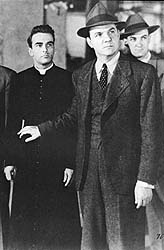
I feel a certain futileness when describing "Strangers on a Train": my words are deficient in describing its excellence. Too, I am having great difficulty calling attention to a detail here, or a detail there, when so much of the picture was handled with great care. A pervasive humor seems to reach out from behind the screen and pinch us, reminding us (as Alfred Hitchcock oft said), "It's only a movie." For one thing, the writing balances within the story both drama and comedy, morbid jokes and adventure: the potentially ridiculous story of Guy Haines and his stalker Bruno Anthony could have more easily been moribund than lively. Guy, played by Farley Granger, is a stuffy sort of hero, stuck with the guilt of a murder he had nothing to do with. Bruno, a wickedly charming Robert Walker, is the real murderer: he strangled Guy's wife and is ready to pin it on him if Guy doesn't scratch Bruno's back (for a favor Guy never asked for): what Bruno wants is a murder in return.
Alfred Hitchcock's symbolic directing feels very much at home in "Strangers on a Train." He uses the camera to create parallels between characters and emphasize notions of guilt and anxiety. The casting is also full of animated faces, character actors like Leo G. Carroll and Hitch's own daughter, Patricia Hitchcock. She seems to be the omnipotent presence of director Hitchcock himself, pointing out all the morose details and giggling all the while.

"I Confess," on the other hand, suffers from being too heavy with not enough comic relief (the light touch that Hitchcock normally exudes). Hitchcock here falls prey to the severity of his subject, a priest (Montgomery Clift) who overhears a murderer's confession in the church is himself accused of the murder, only vows keep the priest from revealing what was said in the privacy of the confessional. The picture circles around this conflict very closely, rarely steering away from it, but with little to distract the audience from the story, they have ample time to find all its contrivances and plot holes. Much of the picture is wasted because of this: the writers spent too much time amassing superficial evidence as to why Clift looks guilty, and then how he ironically can't confess the truth because of his vows. In many ways, the film is as stiff as a corpse.
The film isn't entirely bad--its mainly the writing--and there is plenty to admire and entertain. The opening sequence of the film is inspired, however, by Hitchcock's deft handling of shadows and intrigue: the murderer, in priests clothing, hurries down the alley in true film noir fashion, with the garment's hem hovering just above the cobblestone street. Clift, as well, is the right actor for the role, and he executes the tension between guilt, shame and loyalty fittingly. Karl Malden, too, is wonderful as the smug cop, his squashed nose and pinched eyes working to their full advantage. Melodrama, as much Hitchcock's forte as mystery, suspense or comedy, proves overpowering in "I Confess" With little comedy or adventure to filter out the melodramatic pungency, the film ultimately lacks many of Hitchcock's usual touches. It seems as though his mind was someplace else during this movie.

1 comment:
Thanks for the reply! Everyone has different tastes, and thats what makes talking about movies with other people all the more neccesary: so we can learn to see stuff from different angles. That is why I love reading Pauline Kael--I normally disagree with her, but she never ceases to explain herself and her viewpoint. I never stop reading halfway through just because I disagree with her.
I'm excited to read some of your blogs on different movies out there now. With your expressed distate for trendy "indie" things, I'd like to read your criticisms to films like "Broken Flowers" and "The Squid and the Whale," among others (since those two films seemed to be very popular).
Post a Comment